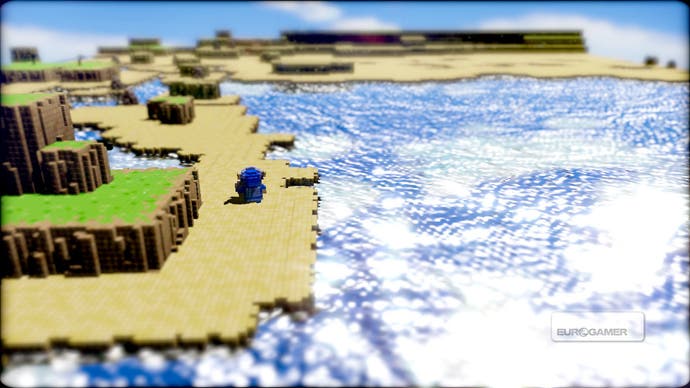3D Dot Game Heroes
Pixel tart.
If an artform comes of age when it starts getting self-reflexive, then games like this, Half-Minute Hero and Retro Game Challenge suggest that we're definitely getting there.
Equal parts homage, pastiche and straight rip-off, 3D Dot Game Heroes takes a decades-old game concept - the original Legend of Zelda, to be precise, though there are more subtle nods to numerous other NES-generation classics - and reimagines its pixel art in gorgeous 3D. It's a naked, nostalgia-soaked appeal to a lost generation of Japanese gamers in their mid-thirties, a generation that has fond, fuzzy memories of the 8-bit looks, music and simplicity that 3D Dot Game Heroes carries off very well.
It's astonishingly beautiful, and that's not pure nostalgia talking (I'm too young, for a start). Seriously, just look at it. Everything is constructed from tiny 3D pixel cubes. Monsters and plants disintegrate back into them when hit with a sword, exploding in a shower of little pieces sent careening across the screen. Water-effect cubes glimmer in the light and little 3D pixel people do their two-frame animations in their pixel houses.

The music, meanwhile, is joyful, ear-infesting chiptune that's about four or five notes away from the Zelda overworld theme. Sound effects are straight from the NES. But there's enough love in the game's look and feel to make it effortlessly likeable. It's more than a hollow facsimile.
It doesn't take long to realise that developer Silicon Studio has left the decades-old gameplay under the hood practically untouched as well. When you open your first chest in your first dungeon and find a boomerang, it's difficult to suppress a smile, but by the time you get to the third or fourth dungeon and find bombs, a hookshot and a fire wand, the joke starts to wear a little thin.
3D Dot Game Heroes doesn't embellish or ironise its gameplay inspiration in the same way as its looks and sound, which makes it difficult to tell exactly what the game is shooting for. Beautiful as it is, it lacks inventive spark, and doesn't display the consistent self-awareness that would elevate it from accomplished homage to creative satire.

Most people will care more about whether it's fun than about how aware it is of its own irony, though, and it certainly is fun. Simplicity is all - one button sends your sword shooting out in front of you, another uses your current item or magic.
You wander a sizeable overworld with one of several pre-fabricated pixel heroes (or you can create your own - more on that later), hitting monsters until they disintegrate, blowing up walls to discover caves and making your way to six different dungeons, where you solve block puzzles and defeat bosses in order to reunite six magic orbs and save the world. Every dungeon contains an item that lets you explore more of the map. Sound familiar?
It does add its own spin to the combat, giving you a sword you can swing in a full circle with the analogue stick and upgrade at blacksmiths for extra reach, width or power. Swords are hidden all over the game with out-of-the-way merchants, in caves or dungeons or in little secret nooks of the map.


